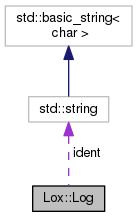|
| enum | EFacility {
kInvalid,
kDaemon = LOG_DAEMON,
kLocal0 = LOG_LOCAL0,
kLocal1 = LOG_LOCAL1,
kLocal2 = LOG_LOCAL2,
kLocal3 = LOG_LOCAL3,
kLocal4 = LOG_LOCAL4,
kLocal5 = LOG_LOCAL5,
kLocal6 = LOG_LOCAL6,
kLocal7 = LOG_LOCAL7,
kSyslog = LOG_SYSLOG,
kUser = LOG_USER
} |
| | C++ aliases for some common Linux syslog facilities. Unused on Windows. More...
|
| |
| enum | EPriority {
kUnknown,
kEmergency = LOG_EMERG,
kEmerg = LOG_EMERG,
kAlert = LOG_ALERT,
kCritical = LOG_CRIT,
kCrit = LOG_CRIT,
kError = LOG_ERR,
kErr = LOG_ERR,
kWarning = LOG_WARNING,
kWarn = LOG_WARNING,
kNotice = LOG_NOTICE,
kInfo = LOG_INFO,
kDebug = LOG_DEBUG
} |
| | C++ aliases for the usual log priority levels are based on syslog. More...
|
| |
|
| static void | log (const EPriority priority, const std::string &msg) |
| | Log the specified message at the given priority. More...
|
| |
| static void | log (const EPriority priority, const char *format,...) |
| | Log a message using the usual printf-style formatting. More...
|
| |
| static void | log (const EPriority priority, const char *format, va_list ap) |
| | Intended mostly for internal use. See the other variadic logging methods instead. More...
|
| |
|
Simple logging methods for each of the priority levels.
|
| static void | debug (const std::string &msg) |
| | Debug. Can be used to facilitate debugging. There will likely be many of these generated. More...
|
| |
| static void | info (const std::string &msg) |
| | Info. Can be used to facilitate debugging. There may be many of these generated. More...
|
| |
| static void | notice (const std::string &msg) |
| | Notice. Normal log message. Everything seems to be working correctly. More...
|
| |
| static void | warn (const std::string &msg) |
| | Warn. Same as warning(). Indicates a minor issue which may need to be brought to the user's attention. More...
|
| |
| static void | warning (const std::string &msg) |
| | Warning. Same as warn(). Indicates a minor issue which may need to be brought to the user's attention. More...
|
| |
| static void | err (const std::string &msg) |
| | Err. Same as error(). Indicates an error condition. The application will attempt to work around it. More...
|
| |
| static void | error (const std::string &msg) |
| | Error. Same as err(). Indicates an error condition. The application will attempt to work around it. More...
|
| |
| static void | crit (const std::string &msg) |
| | Crit. Same as critical(). Indicates a serious problem. More...
|
| |
| static void | critical (const std::string &msg) |
| | Critical. Same as crit(). Indicates a serious problem. More...
|
| |
| static void | alert (const std::string &msg) |
| | Alert. Indicates a serious unexpected condition. Process will likely abort. More...
|
| |
| static void | emerg (const std::string &msg) |
| | Emerg. Same as emergency(). Indicates the process is aborting. More...
|
| |
| static void | emergency (const std::string &msg) |
| | Emergency. Same as emerg(). Indicates the process is aborting. More...
|
| |
|
Variadic logging methods for each of the priority levels.
See the related simpler methods for additional details.
|
| static void | debug (const char *format,...) |
| |
| static void | info (const char *format,...) |
| |
| static void | notice (const char *format,...) |
| |
| static void | warn (const char *format,...) |
| |
| static void | warning (const char *format,...) |
| |
| static void | err (const char *format,...) |
| |
| static void | error (const char *format,...) |
| |
| static void | crit (const char *format,...) |
| |
| static void | critical (const char *format,...) |
| |
| static void | alert (const char *format,...) |
| |
| static void | emerg (const char *format,...) |
| |
| static void | emergency (const char *format,...) |
| |
|
Several static methods to log Lox::Exceptions.
|
| static void | log (const EPriority priority, const Lox::Exception &e) |
| |
| static void | debug (const Lox::Exception &e) |
| |
| static void | info (const Lox::Exception &e) |
| |
| static void | notice (const Lox::Exception &e) |
| |
| static void | warning (const Lox::Exception &e) |
| |
| static void | error (const Lox::Exception &e) |
| |
| static void | critical (const Lox::Exception &e) |
| |
| static void | alert (const Lox::Exception &e) |
| |
| static void | emergency (const Lox::Exception &e) |
| |
Logging system, uses syslog on posix and normal logging on Windows.




